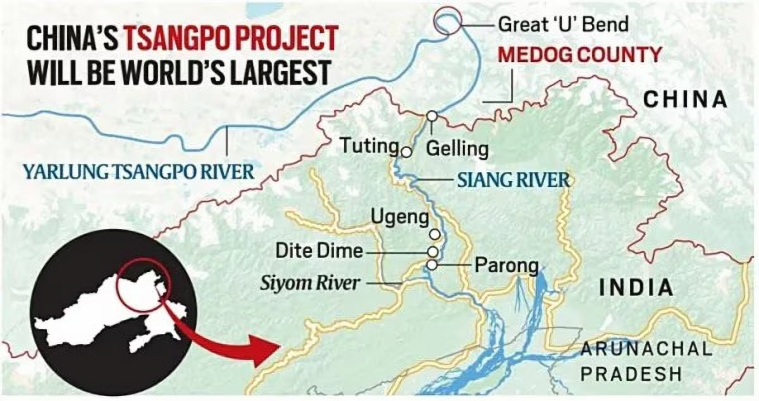China's renewed push to construct a massive hydropower project on the Brahmaputra River in Tibet has drawn pointed attention from New Delhi, with the government stating it is “carefully monitoring” the development and taking all necessary measures to safeguard Indian interests.
Minister of State for External Affairs Kirti Vardhan Singh, responding to a question in the Rajya Sabha, said the government remains vigilant and proactive in protecting the life and livelihoods of citizens residing in downstream areas.
“The Government of India has taken note of reports about the commencement of construction of the mega dam project by China on the lower reaches of the Yarlung Tsangpo (upper reaches of the Brahmaputra) River in Tibet. This project was first made public as far back as 1986 and since then, preparations have been underway in China,” the Ministry of External Affairs (MEA) said in a statement.
Although the dam has remained on Beijing’s infrastructure agenda for decades, the current phase of construction has heightened concern in Delhi over the ecological and strategic implications of the trans-boundary river project.

The MEA underlined India’s established user rights as a lower riparian state and stressed the need for transparency and dialogue. “Government carefully monitors all developments relating to the Brahmaputra river, including plans by China to develop hydropower projects, and takes necessary measures to protect our interests, including preventive and corrective measures to safeguard life and livelihood of Indian citizens residing in downstream areas,” it said.
The two countries have been engaged on trans-boundary water issues through an institutionalised Expert Level Mechanism established in 2006, along with diplomatic exchanges. “Various issues relating to trans-border rivers are discussed with China under the ambit of an institutionalised Expert Level Mechanism which was established in 2006, as well as through diplomatic channels,” Singh informed the Upper House.
Also read: Army, Centre to open Doklam, Chola region for tourism in Sikkim
India has repeatedly conveyed its concerns to China, particularly regarding the need to uphold transparency and consult downstream nations before executing upstream activities that may impact the flow of shared rivers. “As a lower riparian state with considerable established user rights to the waters of the trans-border rivers, Government has consistently conveyed its views and concerns to the Chinese authorities, including on the need for transparency and consultation with downstream countries and has urged them to ensure that the interests of downstream states are not harmed by any activities in upstream areas,” he added.
The resumption of the provision of hydrological data, crucial during monsoons for flood forecasting in Assam and Arunachal Pradesh — has also been flagged by India in recent bilateral interactions.
Singh said the issue was raised during External Affairs Minister S Jaishankar’s visit to China from July 14–16 , 2025, as part of the SCO Foreign Ministers’ Meeting. “The need for cooperation on trans-border rivers, including resumption of provision of hydrological data by the Chinese side has been highlighted by the Government in several bilateral interactions with China including during the recent visit of EAM to China from July 14–16, 2025 for the SCO Foreign Ministers' Meeting,” he said.
Though no formal water-sharing agreement exists between India and China, India continues to rely on upstream data provided by China during the monsoon season. Any disruption or lack of transparency can have significant consequences for flood-prone areas downstream.
The mega dam project is among several infrastructural ventures by China along the Yarlung Tsangpo, which originates in Tibet and enters India as the Brahmaputra. Environmental experts have warned that such projects could disrupt water flow, alter sediment levels, and affect biodiversity in the northeast region of India.



